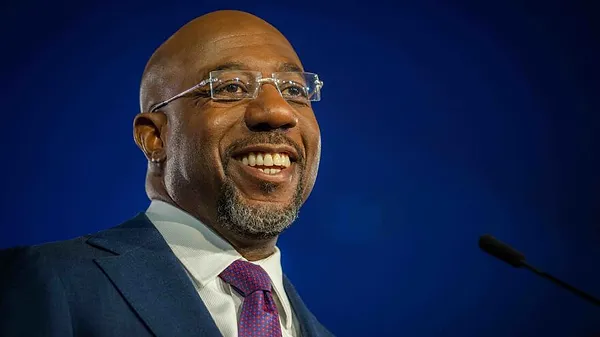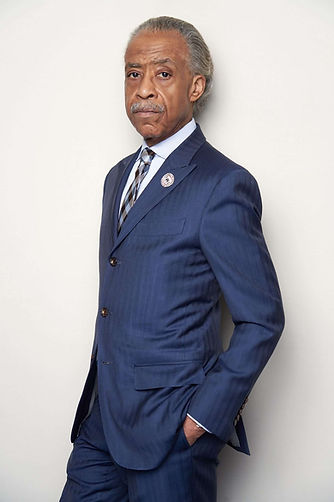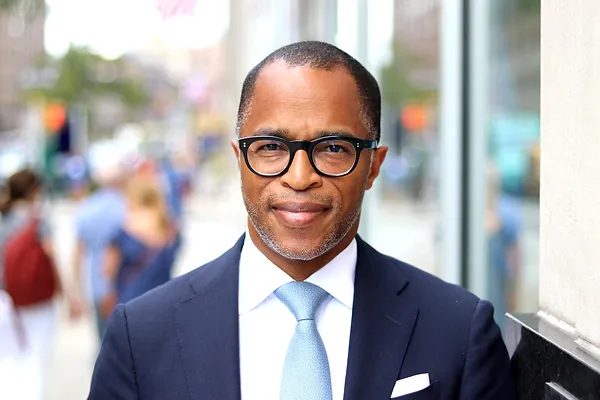Hosted by Jonathan Capehart, the evening will honor Senator Reverend Raphael Warnock and Reverend Al Sharpton for their visionary leadership in the fight for civil rights.
Award Recipients
The John R. Lewis Lifetime Legacy Award

Senator Rev. Raphael Warnock
Senator Reverend Raphael Warnock grew up in Kayton Homes public housing in Savannah, born one of twelve brothers and sisters raised in coastal Georgia.
His father, a veteran, small businessman and preacher, grew up in Burke and Screven County, GA. Senator Reverend Warnock’s mother grew up in Waycross, GA, where she spent summers picking tobacco and cotton. A graduate of Savannah’s Sol C. Johnson High School, Senator Raphael Warnock’s mother and extended family still live in the Savannah area.
Senator Warnock is a proud graduate of Morehouse College; after graduating from Morehouse, he went on to earn a PhD and begin his career ordained in the ministry. For over 16 years, Senator Warnock has served as Senior Pastor at Ebenezer Baptist Church in Atlanta, the former pulpit of Reverend Dr. Martin Luther King, Jr. He is the youngest pastor selected to serve in that leadership role at the historic church.
Senator Warnock was elected to the United States Senate on January 5, 2021, in a special election runoff for the term ending January 3, 2023, to fill the vacancy caused by the resignation of Senator Johnny Isakson, a seat previously held by appointed Senator Kelly Loeffler. He took the oath of office on January 20, 2021.
Currently, Senator Warnock serves on the Agriculture, Nutrition and Forestry Committee; Banking, Housing and Urban Affairs Committee; Commerce, Science and Transportation Committee, as well as the Special Committee on Aging and the Joint Economic Committee.
The March On! Lifetime Achievement Award

Rev. Al Sharpton
Reverend Sharpton has been at the forefront of the modern civil rights movement for nearly a half century. Born in Brooklyn, New York, Reverend Alfred “Al” Sharpton has been preaching since age four. He was licensed and ordained at age nine. In 1971, he founded the National Youth Movement and for seventeen years he led the organization, registering young people to vote and giving them job opportunities. His direct-action and civil disobedience campaigns have brought attention to injustice in many areas.
As an internationally renowned civil rights leader, founder and President of the National Action Network (NAN), Rev. Sharpton has dedicated his life to the fight for justice and equality, turning the power of dissent and protest into tangible legislation impacting the lives of the disenfranchised. As head of NAN, Rev. Sharpton has taken the teachings of the Rev. Dr. Martin Luther King, Jr. and applied them to a modern civil rights agenda. He has been a tireless advocate for everything from police reform and accountability, to protection of voting rights and education, registration campaigns, economic support for small community businesses and confronting corporate racism.
Master of Ceremonies

Jonathan Capehart
Washington Post contributor and host for The Sunday Show, MSNBC
Reverend Sharpton has been at the forefront of the modern civil rights movement for nearly a half century. Born in Brooklyn, New York, Reverend Alfred “Al” Sharpton has been preaching since age four. He was licensed and ordained at age nine. In 1971, he founded the National Youth Movement and for seventeen years he led the organization, registering young people to vote and giving them job opportunities. His direct-action and civil disobedience campaigns have brought attention to injustice in many areas.
As an internationally renowned civil rights leader, founder and President of the National Action Network (NAN), Rev. Sharpton has dedicated his life to the fight for justice and equality, turning the power of dissent and protest into tangible legislation impacting the lives of the disenfranchised. As head of NAN, Rev. Sharpton has taken the teachings of the Rev. Dr. Martin Luther King, Jr. and applied them to a modern civil rights agenda. He has been a tireless advocate for everything from police reform and accountability, to protection of voting rights and education, registration campaigns, economic support for small community businesses and confronting corporate racism.


